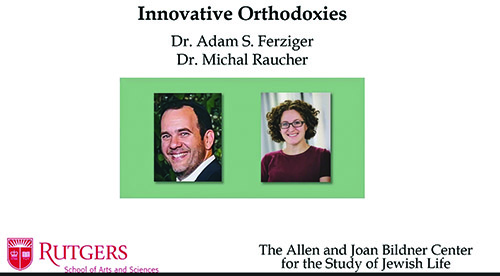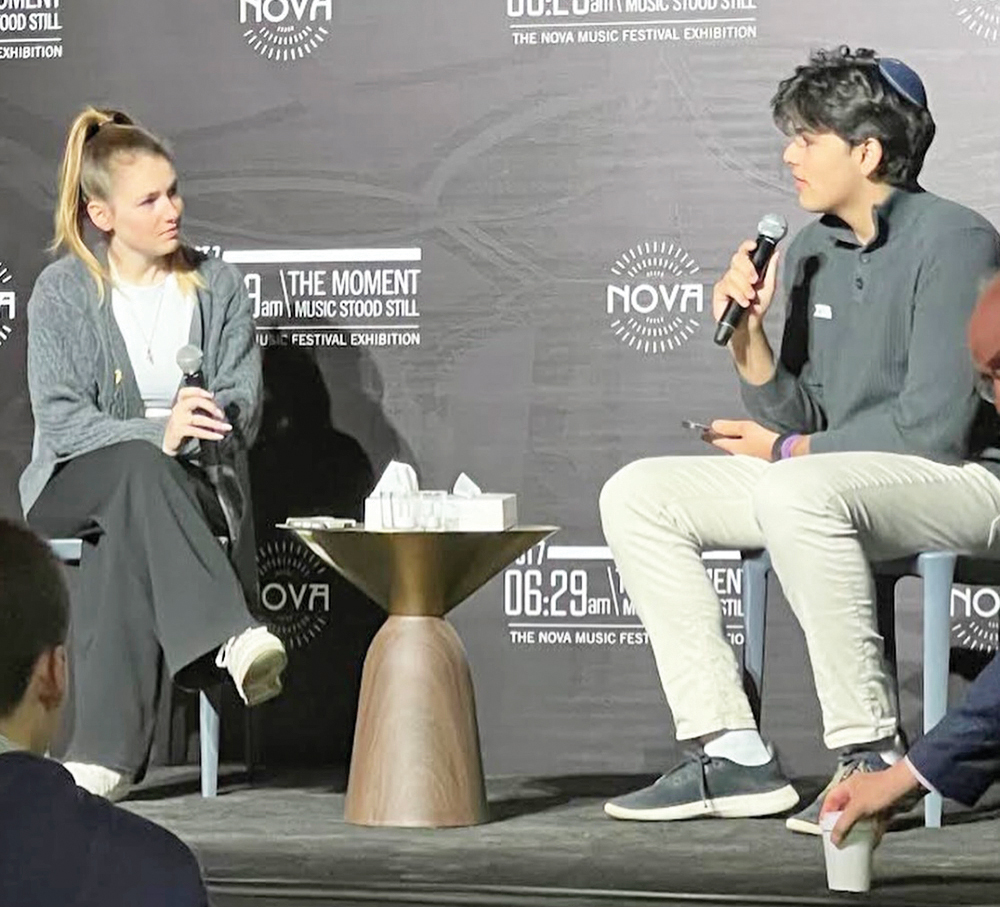


One of the enduring facets of Modern Orthodox life is that while adherents hold fast to the hallmarks of traditional belief and practice, the boundaries and definitions of the community are often evolving to address new sensibilities.
To examine this dialectic and consider new scholarship, the Bildner Center for the Study of Jewish Life at Rutgers-New Brunswick held a two-part online lecture series, “Innovative Orthodoxies,’ in mid-February. Both talks drew a substantial crowd, with five to six dozen viewers joining each of the two midday lectures.
Adam Ferziger spoke on February 10 on the topic “Between American and Israeli Orthodoxy.” Ferziger is the Allen and Joan Bildner Visiting Scholar in 2022, a professor in the Department of Jewish History and Contemporary Jewry, and holds the position of Rabbi S.R. Hirsch Chair for Research on the Torah and Derekh Erez Movement at Bar-Ilan University in Israel. He is a senior associate at the Oxford Centre for Hebrew and Jewish Studies, University of Oxford, and co-convener of the annual Oxford Summer Institute on Modern and Contemporary Judaism.
Ferziger started his talk by posting a picture of current Israeli President Isaac Herzog with current Prime Minister Naftali Bennett, noting that both leaders spent time in their earlier adult life in New York and affiliated with the Ramaz school in New York City and/or the Kehilath Jeshurun shul. And both can be considered aligned with efforts to steer Israeli policy to more moderate approaches that would appeal to Modern Orthodox outlooks.
Ferziger stated that studies of Jewish religious observance in Israel often take one of two frameworks, looking at either 1) the growing differences between Diaspora Orthodox institutions and Israeli Orthodox institutions, or 2) analyses of the extremes of Israeli Orthodox life. He sees a significant and growing trend of Modern Orthodox leadership in Israel, which is driven by a cadre of highly educated, idealistic American-born rabbis and scholars who relocated to Israel in the 1960s and 1970s. Leaders in this vein include Rabbi Aharon Lichtenstein, Malka Bina, Rabbi Shlomo Riskin and Chana Henkin, who set up institutions of higher learning such as Yeshivat Har Etzion, Nishmat and the Lindenbaum Yeshiva, that have now reached thousands of Israelis.
These institutions have embraced different views on the role of women, attitudes to Arabs, opinions on government and other topics than Haredi Israeli schools. Students have encountered these new approaches and adapted them to life in Israel, with some taking leadership roles in major cities across Israel such as R’nana and Modi’in. As another recent Modern Orthodox style adaptation in Israel, Farziger pointed to Michele Farber, wife of Rabbi Seth Farber, who set up the web-based group Hadran to engage women in learning the Daf Yomi and attracted hundreds to a recent siyum.
Ferziger told The Jewish Link, after his talk: “Much recent discussion has highlighted ‘distancing’ between these two major centers of world Jewish life. However, it is not the whole story. In parallel, there are other areas in which meaningful interface between the two communities has grown more palpable in past decades. My research indicates that some of the decidedly creative and dynamic trends in contemporary Israeli religion have resulted from the
‘Israelization’ of approaches that were initially encountered through the seemingly ‘foreign’ voices of American immigrant Jews. In turn, the evolutions taking place in Israel have subsequently gained traction in North America as well.”
Michal Raucher spoke on February 17 on the topic “The New Rabbis: How Women Are Remaking Orthodox Leadership.” Raucher is an assistant professor and undergraduate director in the department of Jewish Studies at Rutgers University. Her research focuses on Israel studies, religious ethics and the anthropology of women in Judaism. As a Fulbright Fellow, Raucher conducted ethnographic research on reproductive ethics of Haredi Jewish women in Israel.
The professor shared her research on the women who received ordination at the Yeshivat Maharat in New York, the seminary established by Rabbi Avi Weiss. He conferred the title of Maharat on Sara Hurwitz in 2009; later that year the two opened Yeshivat Maharat and shortly thereafter Horowitz changed her title to Rabba. As of last year, the school has conferred the title Rabba on 49 graduates.
Raucher noted that parallel moves have been underway at other institutions to engage women in communal religious leadership roles. She pointed to the yoatzot halacha trained at Nishmat in Israel, with a first class graduating in 1999; the “professionalization” of the rebbetzin role as seen in their work in the OU’s Jewish Learning Initiative on Campus; and in the rigorous Talmudic scholarship and academic degrees offered to women in Yeshiva University’s Graduate Program in Talmudic Studies (GPATS) and in the Drisha Scholars Circle.
One thing that these programs have in common, Raucher asserted, is that in their publicity they do not emphasize the titles/degrees conferred, and stress instead that their students are “scholars” and “leaders’ in the community. As one example, she shared a photo of two similarly designed full page ads from Yeshiva University in the same issue of The Jewish Link—one of teachers in the RIETS program and the other of teachers in the GPATS program, both carrying the tagline “Ready to Inspire Your Religious Growth.” She contended that the ads were set as parallels, which subtly demonstrates the prominence of women’s scholarly roles.
Raucher suggested that this common approach may stem, in part, from an OU rabbinical panel in 2017 that asserted that “women in clergy roles or holding clergy titles is at odds with halacha and our Mesorah,” yet also stating, “This panel has also proclaimed and celebrated roles women can and must play, including as educators and scholars …” As another incarnation of women’s religious communal leadership that appears to walk this line, she spoke of the Jewish Orthodox Feminist Alliance’s Devorah Scholars who provide “paid spiritual leadership in shuls.” The Devorah Scholars are engaged by shuls to offer sermons, to teach and provide pastoral care—all roles that “function as clergy,” even if they lack the title.
Marsha Wasserman of Teaneck commented, after Raucher’s talk: “Professor Raucher gave a very helpful overview of the several streams within Modern Orthodoxy that have been contributing to the evolution of women’s roles as spiritual leaders. I especially found the two ads from The Jewish Link, one from YU rebbaim and the other for leaders in the YU Women Talmud Program, to be very interesting. The ads were exactly alike in the design and the format. The colors were different and that one word ‘rebbaim’ was different. It will be very interesting to see how this all falls out in the future.”
By Harry Glazer













